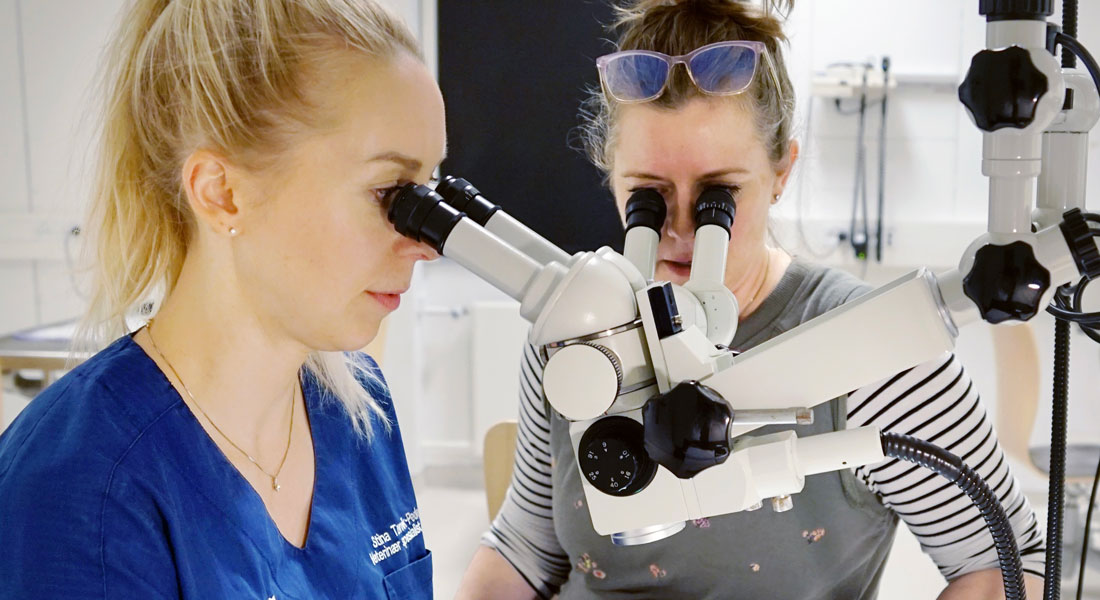Companion Animal Ophthalmology – Companion Animal Ocular Surgery
This course is a specialisation course at the Master of Companion Animal Clinical Science. The Master is a post graduate education targeted small animal veterinarians seeking Continuing Professional Development (CPD).

The purpose of this course is to extend the student’s knowledge, skills and competences within the approach to, assessment and management of the companion animal ocular patient in need of surgery.
The course will extend the students assessment and management of companion animal ophthalmic patients in need of surgery and plan the perioperative management of the patient including special anesthesia and analgesia requirements, as well as pre- and post-surgical treatment.
Read more about the Master of Companion Animal Clinical Science.
A mixture of lectures, e-learning, theoretical and practical exercises. Case-study work.
Having completed the course, the student must be able to:
Knowledge
- Understand the etiology, pathophysiology and clinical appearance of ocular disorders in companion animal patients with focus on surgical intervention.
- Understand the influence of surgical ocular disorders in companion animal patients on the selection of correct surgical approach.
- Use and continue to develop common and typical surgical techniques in the treatment of ocular disease in companion animal patients with focus on saving vision versus acute symptom relief.
- Explain, reflect about, and discuss a problem oriented and evidence based work-up and treatment plan for companion animal patients with surgical ocular disease.
- Define and identify relevant anatomical structures.
Skills
- Perform atraumatic microsurgical techniques in particular with regards to tissue handling and minimal invasive diagnostics in regard to companion animal ocular disorders including entropion, third eyelid prolapse (‘cherry eye’), distichiae, corneal ulceration/corneal perforation, and intraocular foreign body.
- Evaluate, plan and perform reconstructive surgery used for breeds with eyelid diseases as entropion.
- Assess companion animal ocular patients perioperatively with focus on treatment effect, complications and prognosis, including adjuvant therapy.
Competences
- Evaluate, plan and manage a diagnostic work-up for a companion animal patient with an ocular disease in need of surgical intervention.
- Plan advanced therapy/procedure for companion animal ocular patients with focus on saving vision versus acute comfort relieve.
- Independently obtain, evaluate and elaborate on evidence based new knowledge within companion animal ocular surgery.
- Collaborate and communicate within and between specialist and non-specialist peers and lay persons involved in companion animal surgical ocular patient management.
You must meet the following criteria to be admitted to this course:
- Hold a degree in Veterinary Medicine.
- Hold one of the following certifications:
- DVA Certificate in Small Animal Diseases (equivalent to the 4 compulsory courses of the Master of Companion Animal Clinical Science).
- Swedish / Norwegian / Finnish specialist in diseases of dogs and cats.
- Equivalent competences.
- Have a minimum of 2 years of relevant work experience from companion animal practice.
- Be proficient in English.
Find detailed information about the formal requirements for this course.
The course responsible at the specialisation track in Companion Animal Cardiology is:
- Professor of Companion Animal Clinical Oncology Annemarie Thuri Kristensen, University of Copenhagen.
Lecturers at the specialisation track are:
- Assistant Professor of Veterinary Ophthalmology Michala de Linde Henriksen, Colorado State University (CSU).
- National and international capacities within the field.
Course details
| Duration: | 5 days |
| Dates: | Offered next time fall 2026 |
| Frequency: | Only available every second year |
| Course capacity: | 12 students |
| Place: | University Hospital for Companion Animals, Frederiksberg, Denmark |
| Course fee: | EU/EEA citizens Single course participant: 36,500 DKK Master student: 33,000 DKK Non-EU/EEA citizens Single course participant: 40,740 DKK Master student: 37,240 DKK Tuition fees include course materials and lunch/coffee. Books are not included in the tuition fees and must be purchased by the participants. |
| Level and credit: | Master course; 6 ECTS |
| Examination date: | Please consult the exam schedule |
| Application deadline: | Master's programme: 1 May 2025 Course: September 2026 |
| Admission: | To be admitted, you must meet the admission criteria for specialisations at Master of Companion Animal Clinical Science |
The opening of the application period is announced via the programme newsletter.
Download course curriculum
